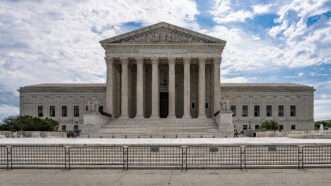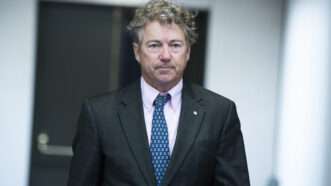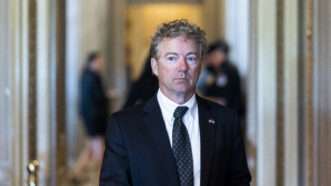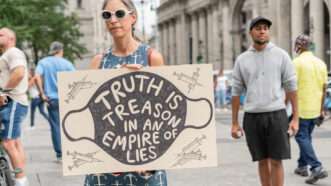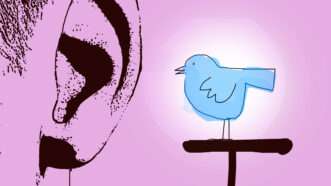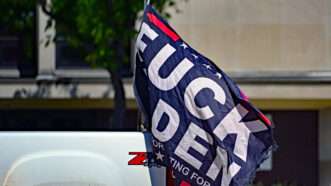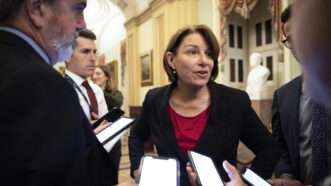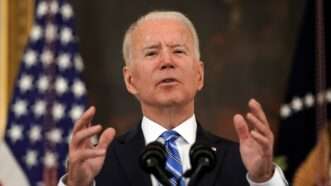Free Speech
Does the First Amendment Shield a Government Official From Being Censured by His Colleagues?
The Supreme Court will hear the case this fall.
Is Face Mask Skepticism Beyond the Pale?
A rational debate requires acknowledging both the strengths and the weaknesses of the scientific evidence.
Trademark Confusion Lawsuit Over "ASU: No More Social Distancing. No More Masks. It Is Time to Party!" Posts
ASU loses, even though the defendant “stopped participating in this action after his answer was stricken” “for litigation misconduct”: “[A]a reasonably prudent consumer would not be deceived or confused into believing that ASU was the ‘source or origin’ of the posts and messages emanating from the ‘asu_covid.parties.’”
One America Network's Libel Lawsuit Against Rachel Maddow Rejected by Ninth Circuit
Maddow had said OAN "really literally is paid Russian propaganda," in reaction to a Daily Beast story that an OAN employee had also been freelancing for Sputnik News.
D.C. High Court Opines on Injunctions Against Speech About People
The decision raises more questions than it answers, but it does note that there is no general First Amendment exception for speech about "matters of private concern" (i.e., daily life matters unrelated to bigger ideological questions).
Rand Paul's Criticism of Cloth Masks Was Stronger Than the Evidence Justifies
Whether or not YouTube should have suspended him, the senator overlooked the limitations of the studies he cited and ignored countervailing research.
Rep. Devin Nunes' Libel Lawsuit Against the Washington Post Can Proceed
"A reasonable juror could ... conclude that the article was materially false because it stated that Nunes had made ... a baseless claim (when he had not)."
Facebook Oversight Board: "Fucking Chinese" Referring to Chinese Government Not Forbidden by Facebook Rules
"It is crucial to ensure that prohibitions on targeting people based on protected characteristics not be construed in a manner that shields governments or institutions from criticism."
The Biden Administration Is Pushing Social Media Platforms To Expand Their Definition of Intolerable COVID-19 'Misinformation'
Online censorship by proxy undermines the ordinary process for checking claims and counterclaims.
California Law Would Limit Free Speech at Vaccination Sites
Plus: Wiretapping social media, Democrats' budget proposal, cryptocurrency regulations, the infrastructure bill, and more..
A Federal Judge Lets a Cruise Line Require Proof of Vaccination, Saying a Florida Law Banning the Practice Is Probably Unconstitutional
Gov. Ron DeSantis' embrace of the law contradicts his avowed commitment to economic freedom.
Florida Ban on Private Businesses Requiring Vaccine Verification Likely Violates the First Amendment
So a federal court concludes, in a decision about cruise lines but using reasoning that likely applies to other businesses as well.
Rubio Bill Would Make Tech Companies Disclose Government Interference
Plus: Congress' gift to Big Tech companies, infrastructure bill costs, and more...
Cal. Legislature on Track to Define "Harass" to Mean "Approach to Speak to," and …
to ban such "nonconsensual and knowing approach[es] within 30 feet of another person ... for the purpose of passing a leaflet ..., displaying a sign to, or engaging in oral protest, education, or counseling" "in connection with any vaccination services."
No Qualified Immunity for University of Iowa Officials Who Violated Christian Students' First Amendment Rights
The U.S. Court of Appeals for the Eighth Circuit provides a useful reminder that qualified immunity is not just for police officers.
Parents Challenging "Anti-Racism" Curriculum Can Litigate Pseudonymously, to Shield Their Children
"The extreme emotions on both sides of this debate make likely the risk of ridicule and mental or physical harm to the parents in this suit—but more concerning—to their minor children."
Judges Say Web Design Is 'Pure Speech' and That the State Can Compel It Anyway
Trump's critics fault him for fomenting division. The left's efforts to drive people of faith from the public square are making the problem worse.
Town Drops Obscenity Case Against New Jersey Homeowner for 'Fuck Biden' Signs
The First Amendment clearly protects the right to political expression, even when it's vulgar.
Judge Strikes All of Michael Mann's Expert Witnesses from Libel Suit
A week after granting summary judgment for another defendant (CEI), the judge rejects all but one of the proffered experts.
Klobuchar's Plan To Combat Vaccine 'Misinformation' Would Have HHS Decide What You Can Post Online
Plus: A possible breakthrough in cheap battery technology, a primer on inflation, the SCOTUS showdown over abortion, and more....
DC Court Grants Summary Judgment for CEI In Michael Mann Defamation Suit
Another significant loss for the controversial climate scientist, though his cases against two remaining defendants will continue.
Bill O'Reilly Gets Temporary Order to Stop Andrea Mackris from Breaching Her Nondisclosure Agreement
Mackris was going to go on The View
Freedom of Speech ≠ The Free Speech Clause
One key difference: The Free Speech Clause is about governmental restrictions on speech; freedom of speech is about restrictions on speech more broadly.
Biden Is Trying to Impose Online Censorship by Proxy
The administration’s public pressure campaign against COVID-19 "misinformation" cannot be reconciled with its avowed respect for freedom of expression.
When Government Urges Private Entities to Restrict Others' Speech
Jen Psaki's comments about the government "flagging problematic posts for Facebook" raises the issue; so does Donald Trump's lawsuit against social media platforms, based on government statements that allegedly coerced those platforms.
Biden Charges Facebook With Homicide, While His Surgeon General Recommends 'Legal and Regulatory Measures' To Suppress COVID-19 'Misinformation'
Speech is protected by the First Amendment even when it discourages vaccination.

